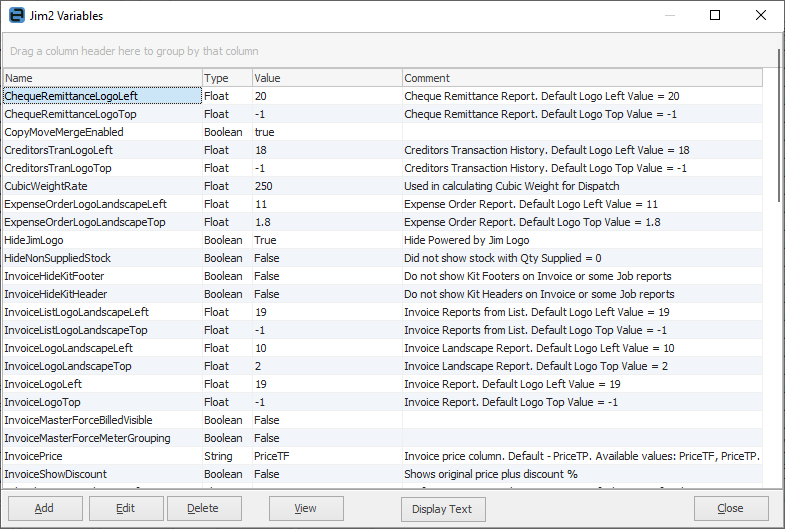

A global variable is a programming language construct, a variable type that is declared outside any function and is accessible to all functions throughout the program. A group of global variables is called a global state, or global environment because, when combined, they define various aspects of a program or the environment when the program runs.
Global variables, as the name implies, are variables that are accessible globally, or everywhere throughout the program. Once declared, they remain in memory throughout the runtime of the program. This means that they can be changed by any function at any point and may affect the program as a whole.
Example
Jim2 has a unique way of including your company logo in selected reports without having to set it up within each report, or using expensive preprinted letterhead.
The position of the company logo is determined by the global variables. You can specify how many report units (millimetres) from the left edge of the report, and how many report units from the top of the report you want the logo to be printed.
Within the scripts there is a default position which is also documented in the comments of each variable.

Not the full list showing here. Comment explains the use of the global variable.
The following global variables are explained more fully here.
Jim2 Global Variable |
Type |
Value |
HideJimLogo |
Boolean |
True. Hides the Jim2 logo on reports. |
InvoiceMasterForceBilledVisible |
Boolean |
False. If changed to True, hide detailed pricing but display price in the summary section. |
InvoiceMasterForceMeterGrouping |
Boolean |
False. If a machine or master is billed using meter kits, the invoice summary section of the invoice will use the same grouping as the jobs it contains. The summary will contain one line for black that contains details for both the black and black overs meter. If kitting is not used, each meter line will have its own summary.
True. The grouping on the actual jobs is ignored. The grouping on the current meter setup is used to determine what summary sections will be displayed. Kitting on jobs is irrelevant. This will change the meter setup today, which will affect any invoice that was generated in the past. |
The following global variables can be used to default changes into the statement in list select:
Jim2 Global Variable |
Type |
Value |
StatementHideDueNow |
Boolean |
True |
StatementHideFullyPaidCurrent |
Boolean |
True |
StatementExcludePrepaymentsInDueNow |
Boolean |
True |
StatementHidePayments |
Boolean |
True |
The following global variables can change current defaults on existing invoice and quote reports:
Jim2 Global Variable |
Type |
Value |
InvoicePrice |
string |
PriceTP (change to TF to show ex GST). |
InvoiceShowDiscount |
True |
True will turn on the Discount column on an invoice as well as a quote. |
And here are a few other global variables you can add to your database, if desired:
Jim2 Global Variable |
Type |
Value |
HideKitHeaderColumnNames |
Boolean |
True (by default the headers show – add this to hide kit header column names). |
CubicWeightRate |
float |
250 (change this value to suit your industry standard for cubic weight if it differs from 250 kilograms per cubic metre). The cubic weight is in kilograms. Cubic weight is calculated by measuring and multiplying the length, height and width of the parcel. The result is then multiplied by the industry standard cubic weight conversion factor of 250. |
ReversePaymentsOnInvoiceUnprint |
Boolean |
False (make True to always reverse payment on unprint invoice). |
SuppressSQLVerMsg |
Boolean |
Set to True to suppress the SQL version warning message. Note that this variable may be removed by upgrades, and may need to be manually added again after an upgrade. |
SuppressWindowsVerMsg |
Boolean |
Set to True to suppress the Windows version warning message. Note that this variable may be removed by upgrades, and may need to be manually added again after an upgrade. |
JobPickingSlipHidecomments |
Boolean |
Set to False to hide job comments in Job – Picking Slip Report. |
PostIntoFuturePeriods |
Boolean |
True. Opens new financial year. |
Further information: